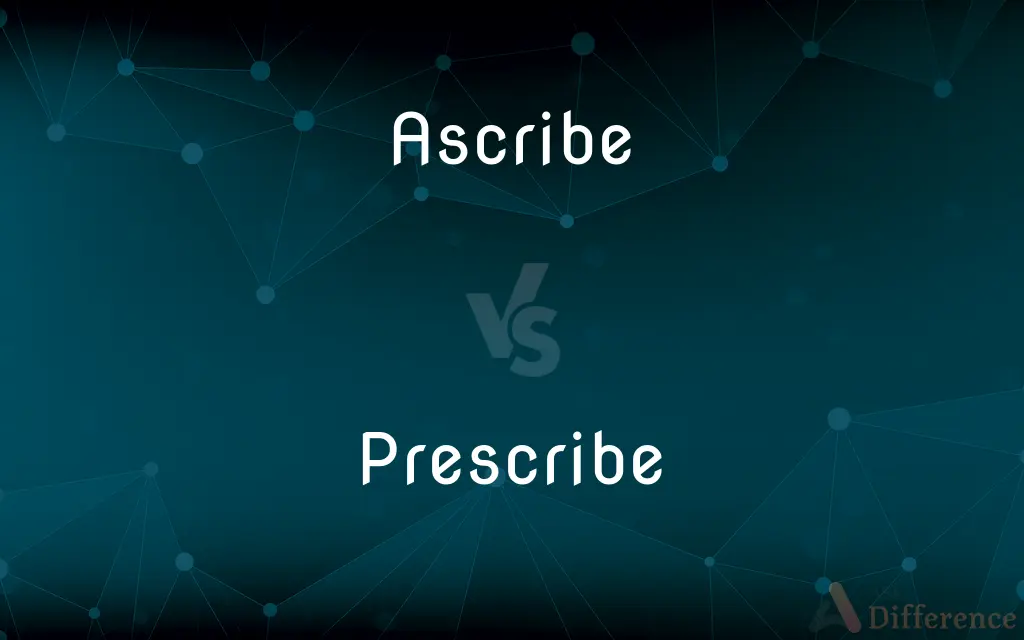Ascribe vs. Prescribe — What's the Difference?
Edited by Tayyaba Rehman — By Fiza Rafique — Updated on March 26, 2024
Ascribe attributes qualities or characteristics, while prescribe suggests recommending or setting guidelines.

Difference Between Ascribe and Prescribe
Table of Contents
ADVERTISEMENT
Key Differences
Ascribe refers to the act of attributing something to a source or cause, indicating where something originates from or what its reasons are. For instance, when historians ascribe a document to a particular era, they are associating that piece of writing with a specific time period based on evidence or stylistic analysis. Whereas, prescribe is related to the recommendation or stipulation of certain actions or rules, often found in medical or regulatory contexts. When doctors prescribe medication, they are advising or ordering the use of specific medicines for treatment based on medical assessment.
While ascribe is commonly used in discussions about responsibility, origins, or characteristics, suggesting a linkage or association between two things, prescribe often enters conversations around solutions, rules, or remedies, implying an authoritative recommendation or directive. This distinction highlights how the former is about identification and the latter about instruction.
Ascribe often deals with more abstract associations, such as qualities, causes, or origins, highlighting a descriptive or explanatory approach. This might involve assigning blame, credit, or characteristics to someone or something. On the other hand, prescribe is concrete, dealing with specific directives, treatments, or rules, which indicates a more prescriptive or directive nature.
In the realm of authorship and creativity, to ascribe a work to an author means to attribute that work to them, often requiring analytical judgment or evidence. Whereas, to prescribe methods or practices in creative fields means to recommend specific approaches or techniques, which can be based on industry standards or proven efficacy.
Ascribe and prescribe also differ in the environments or contexts in which they are most commonly used. Ascription can be found in scholarly, literary, and everyday contexts, where the emphasis is on explaining or understanding the origins or characteristics of something. Prescribing, however, is predominantly found in medical, legal, and regulatory environments, where authority and expertise guide the issuance of recommendations or mandates.
ADVERTISEMENT
Comparison Chart
Definition
To attribute something to a particular cause, source, or origin.
To recommend or dictate a specific course of action or treatment.
Contexts of Use
Scholarly, literary, historical analysis.
Medical, legal, regulatory settings.
Nature
Descriptive, explanatory.
Directive, authoritative.
Common Associations
Origins, causes, responsibilities.
Recommendations, rules, treatments.
Examples
- Attributing a painting to a certain artist. - Ascribing motives to actions.
- Prescribing medication. - Setting out rules or guidelines.
Compare with Definitions
Ascribe
Attribution of characteristics or origins.
Historians ascribe this ancient manuscript to the 10th century due to its writing style.
Prescribe
Recommendation of medical treatment.
The doctor prescribed antibiotics for the infection.
Ascribe
Linking actions or events to reasons.
The increase in wildlife sightings in urban areas can be ascribed to habitat loss.
Prescribe
Dictating a course of action.
The teacher prescribed a new method of study for the class.
Ascribe
Association with a source or cause.
Critics ascribe the success of the novel to its compelling narrative.
Prescribe
Establishing standards or regulations.
Building codes prescribe the materials and methods to be used in construction.
Ascribe
Assigning credit or blame.
Many ascribe the failure of the project to a lack of planning.
Prescribe
Setting guidelines or rules.
The law prescribes a minimum sentence for this offense.
Ascribe
Identifying works with creators.
Scholars ascribe the painting to an unknown artist of the Renaissance.
Prescribe
Advising specific procedures or methods.
The manual prescribes a series of steps for the assembly.
Ascribe
Regard something as being due to (a cause)
He ascribed Jane's short temper to her upset stomach
Prescribe
(of a medical practitioner) advise and authorize the use of (a medicine or treatment) for someone, especially in writing
He was prescribed a course of antibiotics
Her doctor prescribed sleeping tablets
Ascribe
To regard as arising from a specified cause or source
"Other people ascribe his exclusion from the canon to an unsubtle form of racism" (Daniel Pinchbeck).
Prescribe
State authoritatively or as a rule that (an action or procedure) should be carried out
Rules prescribing five acts for a play are purely arbitrary
Ascribe
To regard as belonging to or produced by a specified agent, place, or time
Ascribed the poem to Shakespeare.
Prescribe
To set down as a rule, law, or direction
Prescribed the terms of the surrender.
Ascribe
(transitive) To attribute a cause or characteristic to someone or something.
One may ascribe these problems to the federal government; however, at this stage it is unclear what caused them.
Prescribe
To order the use of (a medicine or other treatment).
Ascribe
(transitive) To attribute a book, painting or any work of art or literature to a writer or creator.
It is arguable as to whether we can truly ascribe this play to Shakespeare.
Prescribe
To establish rules, laws, or directions.
Ascribe
To believe in or agree with; subscribe.
Prescribe
To order a medicine or other treatment.
Ascribe
To attribute, impute, or refer, as to a cause; as, his death was ascribed to a poison; to ascribe an effect to the right cause; to ascribe such a book to such an author.
The finest [speech] that is ascribed to Satan in the whole poem.
Prescribe
(medicine) To order (a drug or medical device) for use by a particular patient (under licensed authority).
The doctor prescribed aspirin.
Ascribe
To attribute, as a quality, or an appurtenance; to consider or allege to belong.
More than good-will to me attribute naught.
Ascribes his gettings to his parts and merit.
And fairly quit him of the imputed blame.
Prescribe
To specify by writing as a required procedure or ritual; to lay down authoritatively as a guide, direction, or rule of action.
The property meets the criteria prescribed by the regulations.
Ascribe
Attribute or credit to;
We attributed this quotation to Shakespeare
People impute great cleverness to cats
Prescribe
(law) To develop or assert a right; to make a claim (by prescription).
Prescribe
To lay down authoritatively as a guide, direction, or rule of action; to impose as a peremptory order; to dictate; to appoint; to direct.
Prescribe not us our duties.
Let streams prescribe their fountains where to run.
Prescribe
To direct, as a remedy to be used by a patient; as, the doctor prescribed quinine.
Prescribe
To give directions; to dictate.
A forwardness to prescribe to their opinions.
Prescribe
To influence by long use
Prescribe
To write or to give medical directions; to indicate remedies; as, to prescribe for a patient in a fever.
Prescribe
To claim by prescription; to claim a title to a thing on the ground of immemorial use and enjoyment, that is, by a custom having the force of law.
Prescribe
Issue commands or orders for
Common Curiosities
Is it correct to say "ascribe blame"?
Yes, it's common to use "ascribe" when assigning blame or responsibility for something.
What is the difference between prescribe and proscribe?
Prescribe means to recommend or mandate, while proscribe means to forbid or prohibit.
What does it mean to ascribe something to someone?
It means attributing a characteristic, action, or outcome to that person as the source or cause.
Can prescribe be used outside of medical contexts?
Yes, it can also refer to setting out rules, guidelines, or methods in various contexts.
Is prescribing always related to medicine?
No, it can also involve recommending actions, rules, or guidelines in non-medical contexts.
What does it mean to ascribe attributes to an object?
It means identifying and attributing specific qualities or features to that object.
How do authors feel about having their works ascribed to them?
Authors usually appreciate correct attribution, as it recognizes their authorship and contributions.
How do historians use the term ascribe?
Historians use it to attribute documents, artifacts, or events to specific periods, cultures, or individuals.
What kind of actions can be prescribed by laws?
Laws can prescribe actions like safety measures, legal procedures, or standards of conduct.
Why is accurate ascription important in historical studies?
It ensures proper understanding and interpretation of historical documents and artifacts.
Can cultural practices be ascribed to specific groups?
Yes, cultural practices can be attributed to specific groups based on historical or sociological evidence.
Can something be prescribed by someone without authority?
Typically, prescribing implies authority or expertise, so it's less common for someone without authority to prescribe.
What happens if something is incorrectly ascribed?
Incorrect ascription can lead to misunderstandings, misattributions, and sometimes legal or academic repercussions.
Can ascribe and prescribe be used interchangeably?
No, they serve different purposes and contexts: ascribe for attribution, prescribe for recommendations.
Who can prescribe medication?
Licensed healthcare professionals, such as doctors and nurse practitioners, can prescribe medication.
Share Your Discovery

Previous Comparison
Terrace vs. Roof
Next Comparison
Immense vs. VastAuthor Spotlight
Written by
Fiza RafiqueFiza Rafique is a skilled content writer at AskDifference.com, where she meticulously refines and enhances written pieces. Drawing from her vast editorial expertise, Fiza ensures clarity, accuracy, and precision in every article. Passionate about language, she continually seeks to elevate the quality of content for readers worldwide.
Edited by
Tayyaba RehmanTayyaba Rehman is a distinguished writer, currently serving as a primary contributor to askdifference.com. As a researcher in semantics and etymology, Tayyaba's passion for the complexity of languages and their distinctions has found a perfect home on the platform. Tayyaba delves into the intricacies of language, distinguishing between commonly confused words and phrases, thereby providing clarity for readers worldwide.














































